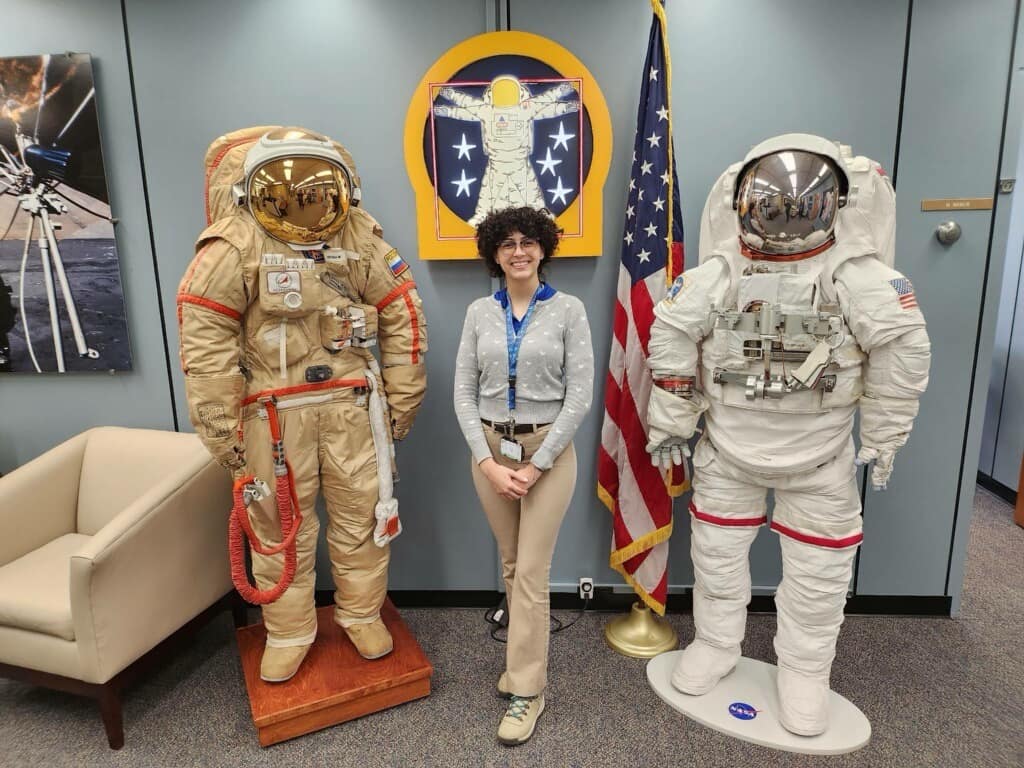Eagle Looks to Past Tragedies to Inform New Space Safety Curriculum

As the commercial space industry continues to boom, Embry-Riddle Aeronautical University senior Liz Bosch has developed a space-safety course curriculum that uses case studies based on past accidents, such as the Columbia and Challenger disasters, to effectively teach “safety and mission assurance.”
“Liz came up with an idea to fill an academic gap by teaching systems engineering concepts using case studies of significant accidents, incidents and close calls in human spaceflight,” said project advisor Dr. Radu Babiceanu, professor in the Department of Electrical Engineering and Computer Science. “This framework also addresses the impact of the decision-making process in the space industry so that disasters like Space Shuttle Columbia or Challenger don’t recur.”
Bosch, who grew up in Carolina, Puerto Rico, decided at age 14, when she saw the Space Shuttle Atlantis exhibit at the Kennedy Space Center, that one day she “would design something like that.” Later, still in high school, she participated in one of Embry-Riddle’s summer aerospace programs and took a class called Introduction to Spaceflight.
“That is where it all connected for me. I was going to be an aerospace engineer,” she said. “My love for space solidified.”
In the spring and summer of 2023, internships at NASA’s Johnson Space Center led Bosch to her interest in Safety and Mission Assurance (S&MA) for space systems. She completed Level 1 of the S&MA Technical Excellence Program, which presented case studies of accidents that have occurred in the space industry.
Currently a senior in Aerospace Engineering, Bosch will go on to a master’s in Systems Engineering in the fall. She also recently won second place for her space-safety curriculum poster at the 2024 American Society for Engineering Education’s Southeastern Section Annual Conference.
“The framework that I have developed is intended to promote safety culture in our engineers,” Bosch said, adding that research has shown that case studies improve retention of course materials, promote critical thinking and problem-solving and “show students the application or relevance of what they are learning.”
Bosch said the approach of the curriculum is for students to perform hazard analyses on space systems “while learning about how their own decision-making can impact the life of a human being, just like how it happened in real life.
“Emotion is uncommon in engineering classrooms, where most things are technical and concrete, yet it is going to be an important factor in this teaching strategy and impacts student motivation. Students will emotionally connect to the event, making them aware of how integrity, ethics and safety culture play a role in the engineering decision-making aspect of human spaceflight.”
As the commercial space industry grows, sending more and more humans into space, “the academic world must prepare for the technological demands of the space industry,” Bosch said. “Without [an emphasis on] safety, accidents like Titan submersible — an example of improper commercialization of an extreme environment — could be more common realities.”
After graduating this spring, Bosch, who is a recipient of the highly competitive Benjamin A. Gilman International Scholarships, offered by the U.S. Department of State, will work for Axiom Space. She has secured a position as an On-Orbit Maintenance and Repair engineer for Axiom, which is developing a commercial space station and is expected to launch its first module by late 2026. Once she earns her master’s in Systems Engineering, Bosch says, she plans to earn a Ph.D. in Electrical Engineering and Computer Science so that she can research and help mitigate the hazards and risks associated with automation and artificial intelligence in human spaceflight.

 Michaela Jarvis
Michaela Jarvis